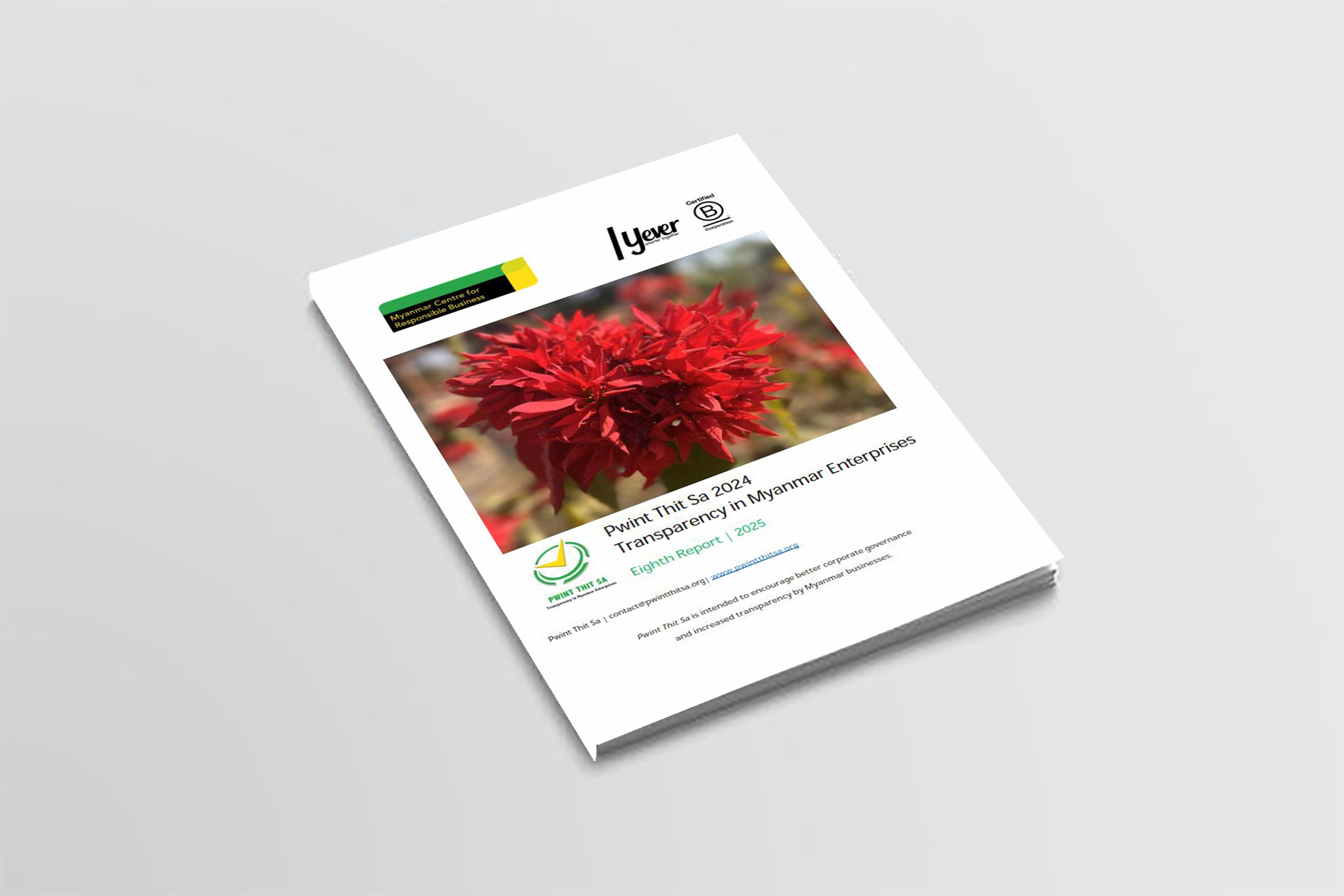2024 Pwint Thit Sa / Transparency in Myanmar Enterprises

The eighth Pwint Thit Sa/Transparency in Myanmar Enterprises (TiME) report was published on 21 March 2025.
Pwint Thit Sa/Transparency in Myanmar Enterprises (TiME) reports assess information disclosure on the corporate websites of Myanmar companies. The objective is to incentivise greater publication of corporate governance (CG) and other information by Myanmar companies through publicly recognising them for their disclosure and transparency. It remains the most extensive public report published about the state of corporate disclosure (CD) in Myanmar.
Download the eighth Pwint Thit Sa Report (2024)
MCRB published the first Pwint Thit Sa report in July 2014, and further reports were published in 2015, 2016, 2018, 2019, 2020 and 2023. Since 2018, the report has covered an expanded number of companies and used criteria aligned with the emerging corporate governance agenda in Myanmar, specifically the ASEAN Corporate Governance Scorecard (ACGS). As in 2018, 2019, 2020 and 2023, the 2024 report has been jointly authored by MCRB and Yever, whose contribution is pro bono.
The 2024 report continues the methodological approach adopted since 2018 by drawing heavily on the ACGS. The ACGS was developed by the ASEAN Capital Markets Forum, of which Myanmar’s Securities and Exchange Commission is a member. It is used widely in the region to assess disclosure of corporate governance by large companies. However, not all ACGS criteria have been used for Pwint Thit Sa and the methodology also sourced from other international standards. Since 2019, some additional performance criteria concerning sustainability and its relationship to the company’s business model have been added, aligned with the Integrated Reporting Framework.
The scoring methodology once again assesses four dimensions - Corporate Profile, Corporate Governance, Sustainability Management and Reporting – using 160 criteria (see Annex to the report). For 2024 a few additional criteria were added related to the revised version of the ACGS and climate change.
Myanmar regulatory requirements for corporate governance and disclosure were summarised in the 2020 Pwint Thit Sa report, and are not substantially changed. For most companies in this study, with the exception of those who are publicly listed and ‘public companies’ with more than 100 shareholders and banks, there is no Myanmar legal requirement to disclose any of this information on their website. However, disclosure can help a company to obtain a competitive edge with potential business partners and investors whose first research on a company may involve looking at their website. This year, the methodology has been further strengthened to distinguish between where companies have a legal obligation to disclose and where private companies are choosing to do so. To incentivize disclosure beyond compliance, bonus points were added where companies volunteered to disclose information such as financial statements.
Pwint Thit Sa 2024 assessed 254 companies of which 31 are banks. These include:
- 8 companies listed on the Yangon Stock Exchange (YSX), of which 2 are banks
- 39 public companies – of which 5 are banks – identified by the SECM as regulated by them because they have more than 100 shareholders
- 180 privately owned companies – of which 20 are banks – who either:
- paid significant commercial and/or Income tax according to the latest top 1,000 Myanmar companies taxpayers list issued by the Internal Revenue Department
- paid significant commercial and/or Income tax according to the latest top 1,000 Myanmar companies taxpayers list issued by the Internal Revenue Department
- are well-known or influential in Myanmar, or
- volunteered to participate
- 27 State-owned Economic Enterprises (SEEs), of which 4 are banks.
Results show that the average score in 2024 was 8% compared to 8% in 2020: overall disclosure remained stable, with some leading companies rising to the challenge of disclosing more data related to Corporate Governance (CG), sustainability management and reporting on their performance. The three companies in 2024 which score highest on corporate disclosure are uab bank, FMI (First Myanmar Investment) and MAHA. Listed companies, which scored average 44%, are outperforming public (5%) and private companies (8%). However, the variance within each category is significant.
As ever, this survey and the ranking it produces is limited by the fact that it only uses publicly available information provided by the companies. It does not assess the quality or detailed performance of the company or the accuracy of the data, something which requires the assurance of an independent expert audit. To combat the risk of companies adopting a tickbox or cut-paste approach, more marks were given for some criteria relating to policies and sustainability to reflect how closely a company’s policy commitment was genuinely aligned to the business. Finally, our direct engagement with companies suggested that those who have higher scores are also those developing a stronger corporate governance culture and understanding of sustainability.
